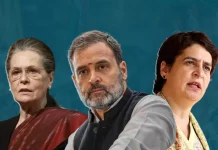Palki Sharma, while talking on geopolitics in one of her interviews on the geopolitical situations, wars, conflict, and adversary scenarios. She is the managing editor of First Post. There are not many media channels doing international news in India so she believes her channel First Post can capture a wider reach currently.
For example Africa, it is a very big market for us because we get a lot of responses from Africa. We are looking at Africa from a completely different point of view. First of all, we are not seeing it as a country, and an exotic land. It is a continent, there are 54 countries. If we tend to bunch it together and think of it as a monolith, it is not going to work. Every bounty has a different ethnicity, stories, and issues, and in the international press, it gets bundled as a problem-riddled land. It only looks at wars, floods, and famines. But there are other things as well other than adversaries. For instance, Netflix is a hub for creating successful even advertising local content and attracting the young masses in Africa. This is going to be the next big workforce, market. This sort of story and highlight of issues will connect with the people more in the international sphere.
Borders give the world a structure, one can not have a borderless world if you are going to administer. Even within the countries, there are states, districts, blocks, panchayats, and villages, they are all made by borders. The rules might be different. But for the needs of the administration, there are structures in place. So that the duties can be assigned to different authorities, individual for their roles and duties. Wars happen because of the political ambitions of people who are in power. When the side thinks that they are being wronged they fight back. So wars happen for various reasons. Borders per se do not trigger wars. For instance, the India and China conflict is due to the refusal to accept borders and respect the other side of the perspective.
The world is led by the pursuit of power and happiness, which everybody chases. Some think it’s money, for some, it’s land, and more power, and some are happy with just a dimple house and car. These are the things which drive the world, ambition, and desire. Many times it makes people do wrong things. But most people are law abiding and that is what keeps the balance. On the geopolitical front, we have two major wars going on presently, and more than thirty other conflicts that nobody is bothered to talk about. There are 8 million people displaced in Sudan, but not seem to be concerned about it. There are billions of dollars of aid in Ukraine, that’s also politics. We are in a phase, that is a multi-polar world. It is not about just one country. More and more countries have gradually figured out that they can stand up for themselves. They don’t necessarily have to do what the big powers are telling them to do.
The second thing about power is that, earlier when two nation-states are at war. So the power rested with the state or the ruler. But in this information age, there is power diffusion. Power rests with the non-state actors as well. It could be a terrorist group, an NGO, a civil society movement, or a tech company. Increasingly government become a stakeholder of power along with other institutions, and agencies. We spend a lot on our military but we are not looking at these other forces of power which are at play. These are also shaking how the world looks at us and how we look at ourselves. These are called soft powers.
China’s soft power is not so great because nobody believes what they are saying. The US has done way better in this context because the world is still thinking of that as the ideal way of life, their value system, and society in general, though it is not. India has done quite fair in this regard by promoting Yoga, Ayurveda and so on. But looming at the larger scale it is still way behind. This is very important to talk about this because these non-state players are attacking your legitimacy. Legitimacy is a power reality at present in the world. When someone is questioning a country’s legitimacy as a democracy. The process of election, winning the election is questioned. This taking away your legitimacy. So one has to build resources to secure it and it comes at a cost. India a still not ready to bear that cost.
Media is very much a part of soft power. There is always a buzz about the press freedom Index, but what about our press presence Index in the world? We are not there in the global space. It is not about talent or resources, India is a very talented country. What we lack is vision. We are nowhere in the picture compared to the rest of the world. For that, we have to build a credible and impactful global media presence. That voice has to be built. Military power, the hard power is certainly important.
For example, recently in 2008, Russia invaded and attacked Georgia. It away two provinces and declared them independent states. The world did not recognise them. Russia kept saying that we did the same that the West did with the Cassombo, which also did not have the UN backing. But that was seen as a legitimate move. When Russia goes into Ukraine it is called the Russian invasion but when the US goes into Iraq, it is called a global war on terrorism. How does this work, because the American media has worked overtime to tell the world that this is for the global good. That is what soft power and media presence give a country. If you don’t have it your intention will be questioned and your reach will always be limited. When we talk about wars, in today’s information age the battlefields are not the fields anymore. They are in the mind. There’s a battle of ideas. India is sitting on the sidelines in the global battle of ideas.
Soft power is attraction, hard power is might. The economy, technology, and military can be used as coercive forces. But you don’t have to force anyone to watch Hollywood or Bollywood movies. That is the pull, attraction. However, both soft power and hard power can be used together to make smart power. A country should aim for smart power, you can’t have one without the other. Bollywood is the soft power of India but is it being converted to any favourable outcomes? Bollywood is largely showing India as a fun-loving, singing, dancing society. Hollywood is making endless movies on the Iraq wars, Afghanistan war, showing their troops so courageous, when aliens attack the world it is the American forces who go and fight them. They are constantly building a narrative. The narratives do not necessarily have to be false or fictional, it has to be rooted in some truth. Then only people will subscribe to it. It has to shape the world’s opinion if you and your opinion of yourself, are equally important.
For instance, if the narrative of India as a country is not safe, too much red-tapism, and not good for business then the invested will get disoriented. When there is a perception the perception matters. When there is a problem it should be fixed. But when the perception is based on someone else’s prejudice, wrong narratives, and lies have to be defied. For example, long ago we had snake charmers but we are not a place of snake charmers but the country of coders. The world should see India as it is today, the new India. Every Indian out of India is India’s brand ambassador, so its our national duty to represent our country in such a manner that it will enhance the picture of India on the world forum. by dissing India and blindly passing statements on global stage , you are negatively affecting the soft power of India. it also stems from the fact that our fellow citizens are still seeking independence mentally from the colonial power by wanting to get validation from the West for our systems.
|
ReplyForward |




















